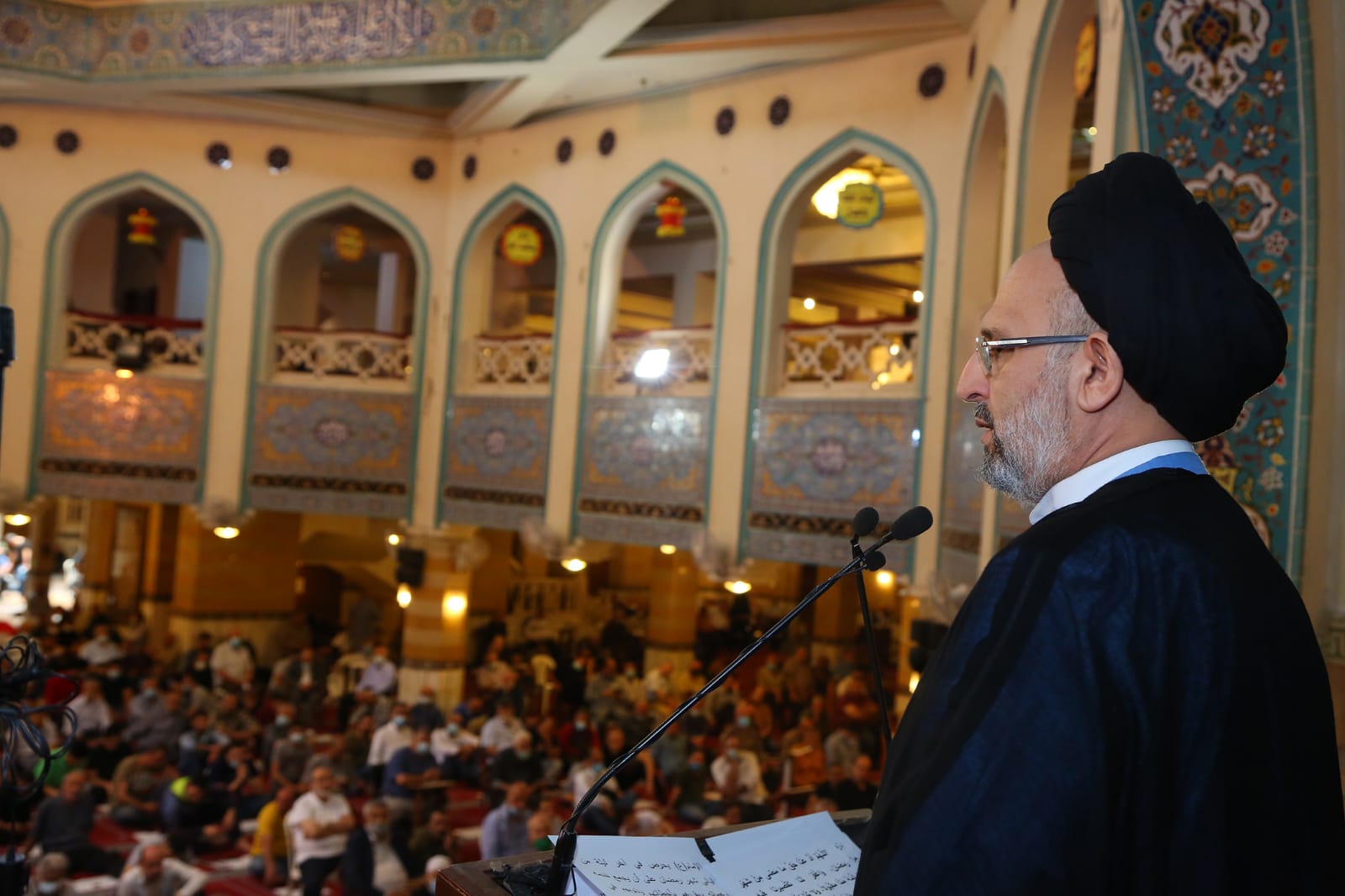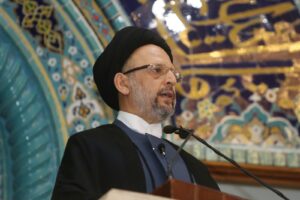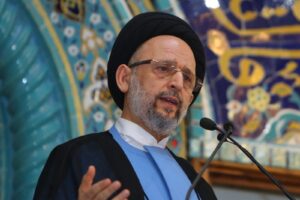In the Footsteps of Al-Hussein (a.s.): The Responsibility of the Nation in Facing Deviation
His Eminence, Sayyed Ali Fadlallah, delivered the two Friday prayer sermons at the Imamain Al-Hassanain Mosque, on Muharram 2, 1447H/ June 27, 2025. Several prominent religious scholars, dignitaries, and hundreds of believers attended the Jumu’a prayer. Following is an edited summary of the sermons
The first sermon
In the Footsteps of Al-Hussein (a.s.): The Responsibility of the Nation in Facing Deviation
Allah, the Most Exalted, say in His Glorious Book:
And let there be [arising] from you a nation inviting to good, enjoining what is right and forbidding what is wrong, and those will be the successful.
This Ayat points to the responsibility that lies upon the nation in working to strengthen moral and faith-based values, and in confronting the phenomena of corruption and deviation occurring within society—whether on the moral, faith, social, or political levels—in order to solidify its position, role, and strength, making it capable of facing challenges.
Allah, the Most Exalted, pointed to the necessity for the nation, with its men, women, youth, girls, and elderly, to cooperate in carrying out this duty when He said:
{The believing men and believing women are allies (supporters or responsible) [editor]of one another. They enjoin what is right and forbid what is wrong…} while He warned against abandoning this responsibility or being negligent in fulfilling it.
This is what came in the Holy Qur’an regarding the reason why the Children of Israel were cursed:
{Cursed were those who disbelieved among the Children of Israel by the tongue of David and of Jesus, son of Mary. That was because they disobeyed and were habitually transgressing. \* They used not to prevent one another from wrongdoing that they did. How wretched was that which they were doing!}
And in the saying of the Messenger of Allah (p.):
“You shall enjoin what is right and forbid what is wrong, or Allah will encompass you with His punishment.”
In another narration from him (p.):
“Indeed, Allah, the Mighty and Majestic, detests the weak believer who has no religion.”
It was asked: What is the weak believer who has no religion? He (p.) said:
“The one who does not forbid wrongdoing.”
And it came in the will of Imam Ali (a.s.) to his two sons, Al-Hassan and Al-Hussein (a.s.), after he was struck by his cursed assassin Ibn Muljam:
“Do not abandon enjoining what is right and forbidding what is wrong, for if you do, your worst will take control over you, and then you will supplicate \[to Allah], but you will not be answered.”
Meanwhile, Allah, the Most Exalted, pointed to how the nation of the Messenger of Allah (p.) reached the status it reached when it carried out the duty of enjoining good and forbidding wrong, and made sacrifices for that, when He said:
{You are the best nation produced for mankind. You enjoin what is right and forbid what is wrong and believe in Allah.}
Beloved ones, we suffer from this painful reality, whether on the religious, moral, social, or political level, because we have come to pass by the corrupt, the deviant, and the oppressor as if we saw nothing—we do not stir a finger to confront them. In fact, we have even stopped denouncing them in our hearts, and we fear confronting them lest our interests or positions be affected.
Therefore, we are concerned with working to change this reality. Change is not an option for us—it is a duty and an obligation that Allah placed upon us. It is like prayer, fasting, and pilgrimage… in fact, it is more important than all of that because through it, the obligations are established, justice in society is reinforced, and society grows stronger.
Indeed, enjoining what is right and forbidding what is wrong is a great obligation by which the other obligations are upheld, sects are secured, lawful earnings are attained, injustices are repelled, the earth is populated, enemies are defeated, and affairs are set straight.
This does not mean that we perform this duty haphazardly, without considering the method or way that ensures achieving this goal, or that we throw ourselves into destruction, or burden ourselves with what we cannot bear. This is not what Allah, the Most Exalted, calls us to, nor what is found in the noble narrations. Rather, we are called, first, to carry out this duty within the limits of the capabilities and abilities we possess, and to do what we can, using the appropriate method, while considering the circumstances we live in, for:
{Allah does not burden a soul beyond that it can bear.}
It came in the Hadith:
“Whoever among you sees wrongdoing, let him change it with his hand. If he cannot, then with his tongue. If he cannot, then with his heart, and that is the weakest of faith.”
If you cannot confront the wrongdoing with your hand, let your tongue express it, and if you cannot with your tongue, let your heart reject it, awaiting an opportunity that allows you to act to change it.
The narration reported from Imam Ali (a.s.) reassures those who enjoin what is right and forbid what is wrong that this will not hasten their death or cut off their sustenance:
“Know that enjoining what is right and forbidding what is wrong will neither bring death closer nor reduce sustenance.”
Secondly, we are to plan for how to carry out this duty, to study the method by which we achieve the goals. Every person has his approach, every society its way, and every stage its means and methods of influence.
Allah, the Most Exalted, has specified for us the means we ought to observe when we enjoin what is right and forbid what is wrong, when He said:
{Invite to the way of your Lord with wisdom and good preaching, and argue with them in the best manner.}
And in the Hadith:
“Only he who possesses three qualities enjoins what is right and forbids what is wrong: acting upon what he enjoins, refraining from what he forbids, being just in what he enjoins, being just in what he forbids, being gentle in what he enjoins, being gentle in what he forbids.”
This is the method employed by the Messenger of Allah (p.) in his call, through which he reached hearts and minds, and opened horizons for his message to spread as it did—not through force or violence. Thus, Allah, the Most High, described him saying:
{And by mercy from Allah, you were gentle with them. And had you been harsh and hard-hearted, they would have dispersed from around you.}
If anyone claims that he (p.) used force to achieve that through the wars that took place in his time, this comes from a lack of understanding of the purposes of those wars—they were not to convey the message, but to remove the obstacles preventing the call or to defend against aggression.
Beloved ones, the value of Ashura is that it comes every year to remind us of this responsibility and to urge us towards it. Enjoining what is right, forbidding what is wrong, and reforming the nation of the Messenger of Allah (p.) is the goal for which Al-Hussein (a.s.) and all those with him sacrificed their souls and blood, and for which great sacrifices were made.
This is what Al-Hussein (a.s.) expressed in his words to his brother Muhammad ibn Al-Hanafiyyah:
“Indeed, I did not rise as an arrogant or prideful person, nor as a corruptor or oppressor. Rather, I rose seeking reform in the nation of my grandfather, the Messenger of Allah (p.). I want to enjoin what is right and forbid what is wrong. Whoever accepts me by accepting the truth, Allah is more worthy of the truth, and whoever rejects me, I will be patient until Allah judges between me and the people with the truth, and He is the best of judges.”
And he called upon the nation—and we are part of this nation—to bear this responsibility when he said:
“O people, the Messenger of Allah (p.) said: Whoever sees a tyrannical ruler, violating the prohibitions of Allah, breaking the covenant of Allah, opposing the Sunnah of the Messenger of Allah (p.), acting among Allah’s worshipers in sin and aggression, and does not change that by deed or word, it is incumbent upon Allah to place him where He places that ruler.”
And when he stirred the resolve for that, saying:
“Do you not see that the right is not being acted upon and falsehood is not being forbidden?”
Imam Al-Hussein (a.s.) worked for this goal with kind words, dialogue, and persuasion. But when he saw that reforming his nation and awakening it from its slumber and indifference would not happen unless he shed his blood and the blood of his companions, he did not withhold that.
Therefore, beloved ones, our loyalty to Ashura and our renewal of the covenant with Al-Hussein (a.s.) does not stop at attending gatherings, shedding tears, or holding banquets and serving food. Rather, we are to be in the same position Al-Hussein (a.s.) stood—acting upon what is right and abandoning what is wrong, having the determination and will to be among those who enjoin what is right and forbid what is wrong wherever we are, achieving the goal we seek, working to establish truth, justice, and goodness as the hallmark of life, refusing that Allah’s lawful be prohibited or His prohibitions made lawful, refusing that Allah be disobeyed, refusing to remain silent over oppression, corruption, or deviation—fearing no blame from anyone, no matter the sacrifices or the costs.
So we may be among those whom Allah described:
{Those who convey the messages of Allah and fear Him and fear no one but Allah. And sufficient is Allah as Accountant.}
May Allah grant us success in that, and the last of our supplications is that all praise is due to Allah, the Lord of the worlds.
In the Name of Allah, the Compassionate, the Merciful
The Second Sermon
Worshipers of Allah, I advise you and advise myself with what the Messenger of Allah (p.) used to supplicate at the beginning of each new Hijri year, when he said:
“O Allah, You are the Eternal God, and this is a new year. I ask You in it for protection from Satan, strength against this soul that commands to evil, and to be occupied with that which brings me closer to You, O Most Generous, O Possessor of Majesty and Honor. O Allah, make us better than they think of us, forgive us for what they do not know, and do not hold us accountable for what they say. Allah is sufficient for me, there is no god but Him. In Him I put my trust, and He is the Lord of the Mighty Throne. Our Lord, do not let our hearts deviate after You have guided us, and grant us from Yourself mercy. Indeed, You are the Bestower.”
We ask Allah, the Most Exalted, to grant us success so this new year may be filled with goodness and righteous deeds, and to make it better than the past, so that we become more aware, more responsible, and more capable of facing challenges.
We begin with the great achievement accomplished by the Islamic Republic of Iran in its response to the Zionist aggression against it. Through this, Iran demonstrated its remarkable capabilities, which surprised the enemy and reached deep into its entity in a way the enemy had not experienced since its inception. This compelled the enemy to stop its aggression and prevented it from achieving its goals — goals that we had previously indicated went far beyond what was announced about preventing Iran from acquiring nuclear capability. The enemy aimed to harm Iran’s military, security, economic, and scientific capacities, as well as the cohesion and unity of its people, even to the point of attempting to undermine its very foundations.
This achievement came despite the assassinations carried out by the enemy, the targeting of military and economic sites, and despite the vast capabilities the enemy possesses and the direct and indirect support it received from the United States and Western countries, as well as the long-term siege Iran has suffered from.
The Islamic Republic of Iran, relying on its own internal capabilities and resources that it has developed without any external support, was able to present a model to be emulated in its ability to stand firm against the greed and schemes of this entity.
Through this achievement, Iran has now become a deterrent factor to this enemy, which will force it to reconsider all its expansionist plans in the region. This achievement will also inspire hope in all those who have suffered the enemy’s crimes and oppression, that they too can regain their freedom, reclaim their rights, and expel the enemy from their lands and their resources.
We, in this regard, congratulate the Islamic Republic of Iran for its ability to repel the aggression, thanks to the awareness of its wise leadership and the steadfastness it demonstrated in confronting this aggression. We are confident that Iran is capable of overcoming all the wounds and pains it has endured, and that it will continue to be loyal to the principles and values it upholds and for which it has made great sacrifices in its support of the oppressed and the downtrodden. Iran will also continue to adhere to its policy of not attacking anyone, but at the same time, it will never accept being attacked by anyone.
On this occasion, we salute the Arab and Islamic countries for the unified position they took in condemning this unjust aggression and rejecting it. However, we call upon them to move beyond mere condemnation to joint action in facing the continuing threat posed by the Zionist enemy, which has always sought — and still seeks — to remain the strongest and most dominant power in this region. It stands in the way of anyone striving to build their own self-reliance, develop their capabilities, and possess their independent decision-making.
We affirm that the Arab and Islamic world has all the capacities and resources needed to confront the challenges of this enemy or any other enemy — if it realizes its points of strength, unites its efforts, and overcomes the internal divisions that continue to fragment its power and dissipate its influence. The enemy actively works to deepen these divisions by stirring sectarian, denominational, and nationalist sentiments, reviving the negative aspects of history, and by instilling fear among these countries from one another.
Turning to Gaza, we see that the Zionist enemy continues to commit the most horrific massacres there, engaging in mass killings that even target those who are simply trying to secure their basic needs of food and medicine under the suffocating siege imposed on them — crimes that disgrace all of humanity. Sadly, all this is happening while the world remains silent and unmoved, failing even to issue statements of condemnation.
We salute the steadfastness of this people and their firm attachment to their land and their brave resistance, armed with their faith in Allah and their right to freedom. We are confident that despite their limited means and the enormous sacrifices they are making, they will prevent the enemy from achieving its goals and will ultimately fulfill their aspirations to live with dignity on their land and to possess their independent decision-making — sooner or later.
As for Lebanon, the Zionist enemy continues its attacks through ongoing air raids on its regions, assassinations of Lebanese citizens while they travel or even inside their villages, the destruction of the remaining houses in the border villages to prevent people from returning to them, and the regular flights of its drones over Lebanese areas reaching as far as Beirut. Through these actions, the enemy aims to pressure Lebanon into submission and acceptance of its demands that would compromise the country’s sovereignty, security, and stability.
We once again call upon the state to assume its responsibility toward its citizens and to fulfill its duty to protect them. It is unacceptable for this situation to pass without even statements of condemnation or denunciation — which are the minimum expected — nor for diplomatic efforts to stop, as they are essential to create international pressure on the Zionist entity to compel it to abide by existing agreements.
In this context, we renew our call to all Lebanese to remain faithful to this homeland, to unite in facing the pressures they are currently enduring or will face, pressures that threaten their security and sovereignty. We urge them to recognize their points of strength and not to allow the enemy to exploit their words, statements, and positions for its benefit.
Finally, next week, on this very day — Friday, July 4 — we will mark the anniversary of the passing of the late Sayyed, myy father (ra), who has continued to live among us and never abandoned us through all the circumstances, difficulties, and challenges.
From him, we drank from the fountain of knowledge, thought, words, advice, and teachings. He dedicated his life to lifting us from weakness, ignorance, and backwardness. He deepened our awareness of Islam in its purity and clarity, and taught us that life is not built on weakness and surrendering to the status quo, but on the logic of dignity and freedom, on living with the concerns of all people — all people and the entire nation — and on taking honorable stances, without fearing the blame of any critic for the sake of Allah.
Due to the difficult circumstances we are experiencing, we will not hold a commemorative ceremony this year. Instead, we will gather on that day to send him our peace and offer him the reward of reciting Al-Fatiha, in recognition of his favor upon us and in gratitude for what he offered — a legacy we shall preserve with all the strength we can.




